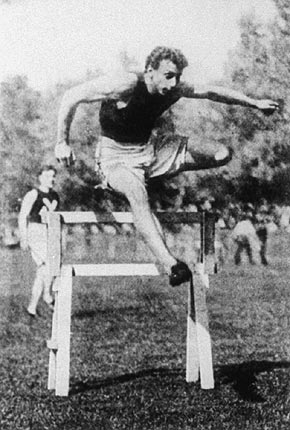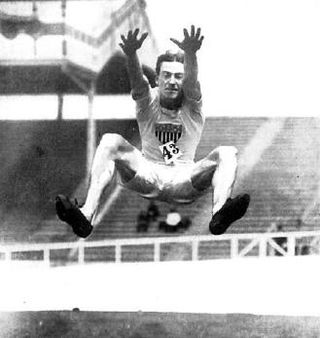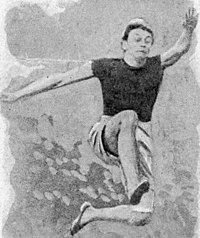
At the 1900 Summer Olympics, twenty-three athletics events were contested. Altogether, 117 athletes from 15 nations competed. A total of 68 medals were awarded. In many countries, due in part to the conflation of the Olympic Games and the World's Fair in Paris, the media discussed only the athletics events under the "Olympic" name while ignoring the incredible variety of other sports featured at the time.

Alvin Christian "Al" Kraenzlein was an American track-and-field athlete known as "the father of the modern hurdling technique". He was the first sportsman in the history of the Olympic games to win four individual gold medals in a single discipline at the 1900 Summer Olympics in Paris. As of 2016, Alvin Kraenzlein is the only track-and-field athlete who has won four individual titles at one Olympics. Kraenzlein is also known for developing a pioneering technique of straight-leg hurdling, which allowed him to set two world hurdle records. He is an Olympic Hall of Fame (1984) and National Track and Field Hall of Fame (1974) inductee.

The men's 60 metres was the shortest of the track races at the 1900 Summer Olympics in Paris, which was the first time the event was held. It was held on 15 July 1900. 10 athletes from 6 nations competed. Five preliminary heats were scheduled, though only two were actually held. The top two athletes from each of the heats advanced to the final, resulting in a final race that featured three United States runners and an Australian. Hurdle specialist Alvin Kraenzlein of the United States won the event, with his countryman Walter Tewksbury in second and Australian Stan Rowley earning bronze.

The men's 110 metres hurdles was the first of the track and field events on the athletics programme at the 1900 Summer Olympics in Paris. It was held on July 14, 1900. Nine athletes from three nations competed in the shortest of the hurdling events. The event was won by Alvin Kraenzlein of the United States, the second of five consecutive victories for the nation in the first five Olympic Games. It was also the first of four consecutive podium sweeps for the Americans in the event.

The men's 200 metres hurdles was a hurdling event on the athletics programme at the 1900 Summer Olympics in Paris. It was held on July 16, 1900. 11 athletes from five nations competed in the middle of the three hurdling events. The event was won by Alvin Kraenzlein of the United States, earning his fourth individual gold in athletics in one Games—a record that still stands as of the 2016 Games. The silver medal went to Norman Pritchard of India, while another American earned bronze.

The men's high jump was a track & field athletics event at the 1900 Summer Olympics in Paris. It was held on July 15, 1900. Eight athletes from seven nations competed in the high jump. The event was won by Irving Baxter of the United States, the nation's second consecutive victory in the men's high jump. Great Britain and Hungary each took medals in their first appearance in the event.

The men's pole vault was a track & field athletics event at the 1900 Summer Olympics in Paris. It was held on July 15, 1900. Eight athletes from five nations competed in the pole vault.

The men's triple jump was a track & field athletics event at the 1900 Summer Olympics in Paris. It was held on July 16, 1900. 13 athletes from six nations competed. The event was won by Myer Prinstein of the United States, the nation's second consecutive victory in the men's triple jump. Prinstein became the first, and through the 2016 Games, only, person to have won both the long jump and the triple jump. James Brendan Connolly took second, making him the first man to medal twice in the triple jump. Lewis Sheldon finished third, completing what would later be known as a medal sweep.

MyerPrinstein was a Polish American track and field athlete who held the world record for the long jump in 1900 and won four gold medals in three Olympic Games for the long jump and triple jump. He was a member of the Irish American Athletic Club in Queens, New York. A 1902 law graduate and track team captain for Syracuse University, after college he became a New York real estate lawyer and businessman while living in Jamaica Plains, Queens. To date, he is the only Olympic track athlete to win both the triple and long jump in the same Olympics, earning the distinction in St. Louis in 1904.

The men's long jump was one of six jumping events on the Athletics at the 1908 Summer Olympics programme in London. The competition was held on July 22, 1908. Thirty-two athletes from 9 nations competed. NOCs could enter up to 12 athletes. The event was won by Frank Irons of the United States, the nation's fourth consecutive victory in the first four Olympic Games. Calvin Bricker of Canada took bronze to break up the Americans' attempt at another sweep.

The men's standing high jump was one of six jumping events on the athletics at the 1908 Summer Olympics programme in London. The competition was held on July 23, 1908. 23 high jumpers from eleven nations competed. NOCs could enter up to 12 athletes. The event was won by Ray Ewry of the United States, his third consecutive victory in the event. Ewry won all eight standing jump events from 1900 to 1908 as well as both events at the 1906 Intercalated Games. Konstantinos Tsiklitiras of Greece took silver, tying with American John Biller. Tsiklitiras was the first non-American to medal in the event; the United States had swept the medals in both 1900 and 1904.

The men's standing long jump was one of six jumping events on the athletics at the 1908 Summer Olympics programme in London. The competition was held on Monday, July 20, 1908. Twenty-five long jumpers from eleven nations competed. NOCs could enter up to 12 athletes. The event was won by Ray Ewry of the United States, his third consecutive victory in the event. Ewry won all eight standing jump events from 1900 to 1908 as well as both events at the 1906 Intercalated Games. Konstantinos Tsiklitiras of Greece took silver. American Martin Sheridan earned bronze.
Peter O'Connor was an Irish track and field athlete who set a long-standing world record for the long jump and won two Olympic medals in the 1906 Intercalated Games.
Patrick Joseph Leahy was an Irish athlete who won Olympic medals in the high jump and long jump at the 1900 Summer Olympics.

The men's long jump was a track and field athletics event held as part of the athletics at the 1904 Summer Olympics programme. It was the third time the event was held. Nine athletes from three nations participated. The competition was held on Thursday, September 1, 1904.

The men's triple jump was a track and field athletics event held as part of the athletics at the 1904 Summer Olympics programme. It was the third time the event was held. Seven athletes, all from the United States, participated. The competition was held on Thursday, September 1, 1904.

The men's triple jump was an event at the 1956 Summer Olympics in Melbourne, Australia. The event was also known at the time as the hop, step and jump. Thirty-two athletes from 20 nations competed. The maximum number of athletes per nation had been set at 3 since the 1930 Olympic Congress. The event was won by Adhemar da Silva of Brazil, successfully defending his 1952 title. He was the second man to do so, after Myer Prinstein in 1900 and 1904. Vilhjálmur Einarsson won Iceland's first Olympic medal in any event with the silver in this competition. Vitold Kreyer put the Soviet Union on the men's triple jump podium for the second Games in a row with his bronze.
Justus Moak Scrafford was an American track and field athlete who competed at the 1900 Summer Olympics in Paris, France.
The men's long jump event at the 2000 Summer Olympics took place on Monday, 25 September, and Thursday, 28 September 2000, in Sydney, Australia. Fifty-three athletes from 38 nations competed. The maximum number of athletes per nation had been set at 3 since the 1930 Olympic Congress. The event was won by Iván Pedroso of Cuba, the nation's first medal and title in the men's long jump; it snapped a four-Games streak of American victories. Jai Taurima took silver, Australia's third silver in the event. Roman Shchurenko earned Ukraine's first medal in the men's long jump with his bronze. It was the first time the United States had competed in the event and not won at least a silver medal; the Americans had previously failed to place in the top two only at the boycotted 1980 Games.

The long jump at the Summer Olympics, is grouped among the four track and field jumping events held at the multi-sport event. The men's long jump has been present on the Olympic athletics programme since the first Summer Olympics in 1896. The women's long jump was introduced over fifty years later in 1948, and was the second Olympic jumping event for women after the high jump, which was added in 1928.
















